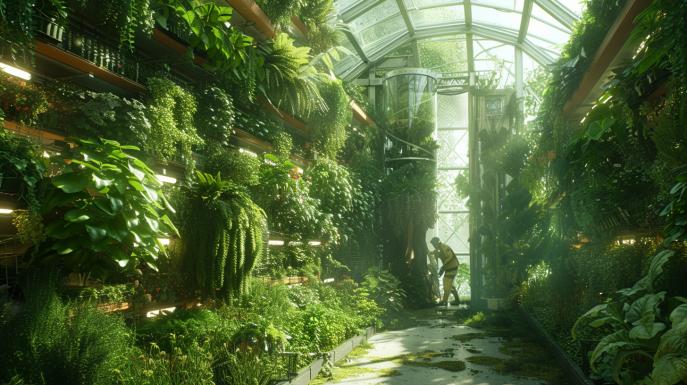In a world where sustainability has become the echo of every choice we make, agriculture is not left behind. “Sustainable Agriculture: Paths to the Future” is more than a motto; It is an invitation to discover ecological agricultural practices capable of harmonizing productivity and respect for the environment. Discover how saving water and product certification can drive a green revolution in the heart of our land. Join us on this journey of renewal, where each grain tells a story of innovation and hope for a more prosperous future.
Is Sustainable Agriculture Really Efficient for the Environment and Economy?
Ecological agricultural practices balance productivity with environmental protection – adopting techniques such as crop rotation and covering, use of organic fertilizers, and integrated pest management. Saving water is another crucial facet, bringing in methods such as drip irrigation, which increases efficiency and reduces waste. Furthermore, agricultural product certifications reinforce the commitment to sustainability, offering consumers more conscious options and supporting producers by opening new markets.
What Technologies Are Driving Sustainable Agriculture?
Technology is fundamental in optimizing natural resources for more sustainable agriculture. Integrated production systems promote sustainability by combining different agricultural and livestock practices, thus optimizing the use of resources. For sustainable irrigation, advancements such as drip irrigation allow for more efficient use of water. These innovations are crucial in sustainable agriculture, contributing to environmental health, economic profitability and social equity.
How to Implement Sustainable Agriculture Practices?
The implementation of sustainable agriculture practices must begin by recognizing the vital role that agriculture crop rotation performs. This technique is crucial to prevent the depletion of specific nutrients, also reducing the accumulation of pests and diseases. Applying it effectively is essential for a sustainable agricultural system. A organic agriculture complements crop rotation, using natural fertilizers that release nutrients slowly, protecting water sources from contamination. As regards the soil management, practices such as the use of cover crops help prevent erosion and improve soil fertility. Finally, the natural pest management involves using natural predators and resistant crops, minimizing the use of chemical pesticides and contributing to safer and more sustainable food systems.
The Role of Sustainable Agriculture in the Future of Global Food
How does sustainable agriculture impact global food security? Sustainable agriculture contributes significantly to food security by prioritizing environmental health, economic viability and social equity. This approach produces food without compromising the ability of future generations to do the same. Food security is enhanced through practices that maintain biodiversity, improve soil health and conserve water resources.
Sustainable agriculture means having responsible agricultural production that considers the impact on the environment and future generations, investing in crop rotation and using organic fertilizers. Regenerative agriculture, part of this broader scope, focuses on revitalizing soil health and regenerating degraded ecosystems, bringing tangible benefits to environmental sustainability and future food security.
Incentives for adopting sustainable agricultural practices vary globally, but include government investment and support from non-governmental organizations. These incentives not only promote more environmentally friendly methods, but also meet growing consumer demand for sustainably grown products. Sustainable agriculture is vital to creating a more equitable and healthy global food system, addressing environmental issues such as water scarcity and deforestation and contributing to mitigation and adaptation to climate change.
By examining environmentally friendly agricultural practices, innovative technologies, and the implementation of sustainable methods, this article has uncovered the transformative potential of sustainable agriculture for the environment and the economy. We outline the ways in which water conservation, technology and balanced soil management can enhance food security and support responsible agricultural production. Looking to the future, sustainable agriculture not only promises a greener planet, but also encourages a global food system that can support generations. Current practices are a testament to how small seeds of change can grow to become robust solutions for the world's food.
FAQ about Sustainable Agriculture
What sustainable agricultural practices contribute to environmental protection?
Sustainable agricultural practices contribute to environmental protection through techniques such as crop rotation and covering, the use of organic fertilizers and integrated pest management. Saving water, including methods such as drip irrigation, is also essential to increase efficiency and reduce waste.
How does technology help in sustainable agriculture?
Technology helps optimize natural resources and promotes sustainability in agriculture. Innovations such as drip irrigation and integrated production systems, which combine agriculture with livestock, are vital for environmental health, economic profitability and social equity.
What are the first steps to implementing sustainable agriculture?
To implement sustainable agriculture, it is essential to start with crop rotation to avoid nutrient depletion and the accumulation of pests and diseases. Organic farming and soil management with cover crops are important subsequent practices. Additionally, natural pest management minimizes the use of chemical pesticides.
What is the impact of sustainable agriculture on global food security?
Sustainable agriculture has a positive impact on global food security. Through a focus on environmental health, economic viability and social equity, it is possible to produce food sustainably, maintaining biodiversity, improving soil health, conserving water resources and ensuring food production for future generations.
How does sustainable agriculture shape the future of global food?
Sustainable agriculture prepares the future of global food by producing responsibly, considering the environmental impact and the ability of future generations to maintain food production. Practices like regenerative agriculture revitalize soil health and regenerate degraded ecosystems. Government incentives and support from NGOs are crucial for the adoption of these practices, ensuring a fairer and healthier global food system.


